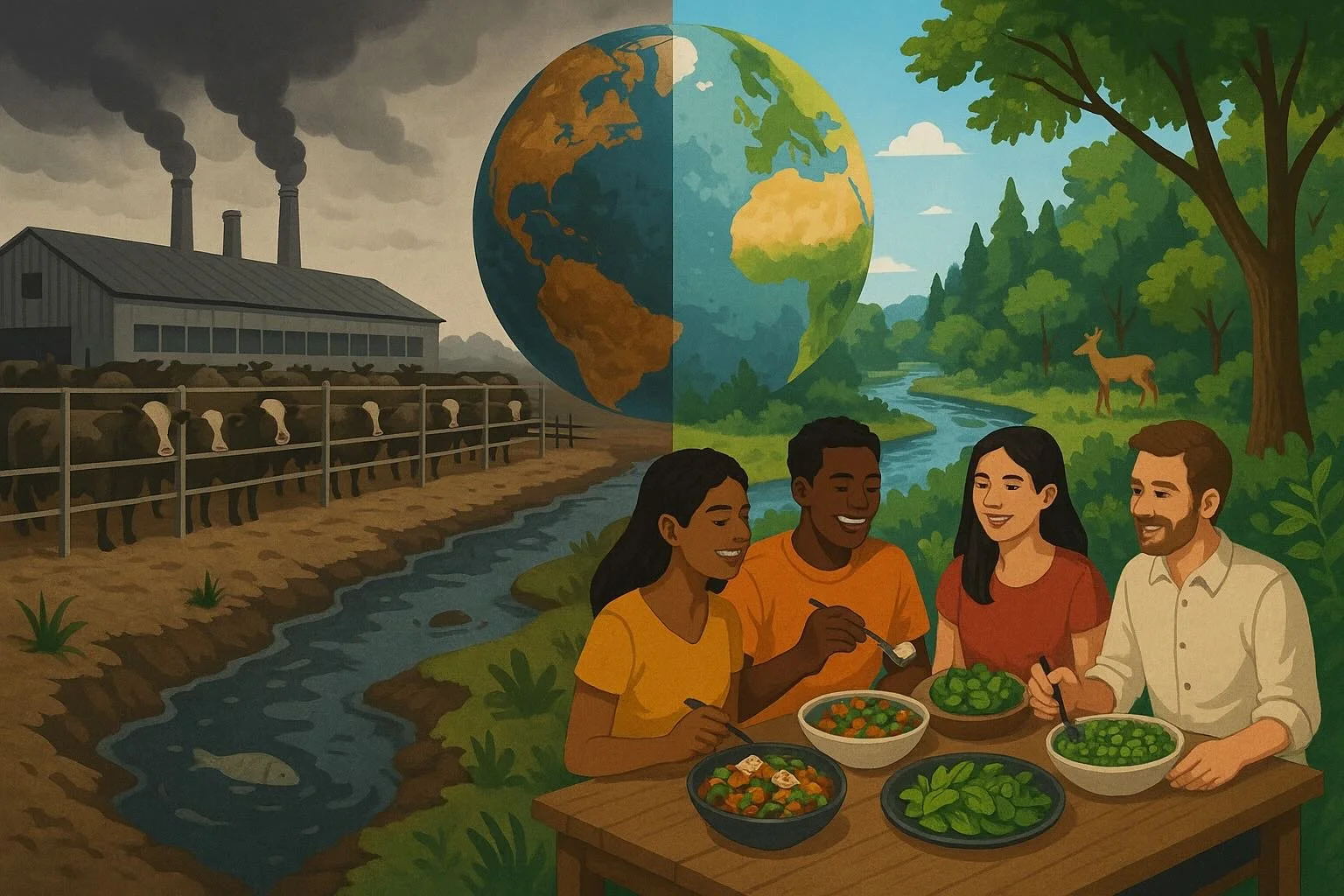What the World Could Look Like with More Plant-Based Meals
What if changing the world didn’t require a revolution—just a meal?
Every time we choose plants over animal products, we shape a future that’s cleaner, kinder, and more sustainable. Not through abstract ideals, but through everyday acts: what we cook, what we share, what we reach for when we’re hungry.
Here’s a glimpse into the world we could build—one plant-based meal at a time.
1. 🌱 A Planet with Cleaner Air and Water
Animal agriculture is a leading contributor to climate change, deforestation, and waterway pollution. But every plant-based swap—from tofu to tempeh, lentils to legumes—can dramatically lighten that load.
Fewer emissions: Producing tofu emits up to 30 times less CO₂ than beef per kilogram, depending on the production method. Even at the lowest tofu estimates, the difference remains substantial.
Cleaner water: Less livestock means less manure and fertiliser runoff, which currently pollutes rivers, coasts, and coral reefs.
Less water used: Tofu production requires roughly 1,800–2,500 litres of water per kg, compared to over 15,000 litres for beef.
And it’s not just about reducing harm. Shifting land away from livestock could allow forests to regrow, soils to heal, and ecosystems to thrive—actively pulling carbon from the air through rewilding. That’s not just sustainability. That’s restoration.
2. 🍎 A Healthier World for More People
Whole food, plant-based diets are linked to lower rates of heart disease, type 2 diabetes, high blood pressure, and certain cancers. But not all “plant-based” meals are created equal.
For optimal health, it’s best to focus on unprocessed or minimally processed plant foods—like vegetables, whole grains, tofu, beans, fruits, and nuts. Many ultra-processed vegan products (e.g., sugary snacks, heavily engineered meat substitutes) can still be high in salt, sugar, and saturated fats.
On a larger scale, plant-based eating also relieves pressure on our food systems:
Feeding animals to feed people is inefficient. Vast amounts of land, water, and crops are used to grow feed rather than food.
By redirecting resources, we can improve food access in vulnerable regions and reduce global hunger risks.
We’re not just eating for our own health. We’re eating in solidarity with others.
3. 🐄 A Kinder, More Compassionate World
Industrial livestock systems raise billions of animals in conditions that often prioritise output over welfare. By choosing plant-based meals, we reduce the demand that fuels these systems—without needing to argue or shame.
Every tofu bánh mì or lentil stew becomes a quiet act of kindness. A personal declaration that animals aren’t ours to exploit. That compassion can be a daily practice, not just a lofty idea.
This isn’t about being perfect. It’s about participating in change.
4. 🌳 A Future That Can Sustain Itself
Plant-based diets use fewer resources across the board:
Less land: Animal agriculture occupies 26% of Earth’s ice-free land, and 1/3 of cropland goes to livestock feed.
Less energy: Plant protein production is significantly more energy-efficient per calorie.
More potential: Reclaimed land could support forests, biodiversity, and regenerative farming.
And yes, it matters how plant-based foods are produced. Some highly processed plant-based alternatives can be more resource-intensive than whole foods due to packaging, transport, or industrial manufacturing.
So while all plant-based meals help, meals built from whole, low-processed ingredients like tofu, legumes, grains, and vegetables deliver the greatest benefit—to both body and planet.
🔁 Flexibility Matters: One Meal Is Enough
A fully vegan world isn’t the only path to progress. The EAT-Lancet Planetary Health Diet, endorsed by global health and sustainability experts, encourages a flexitarian model: mostly plants, with modest animal product consumption. It’s a realistic roadmap that works across cultures, incomes, and preferences.
So whether you’re replacing one meat meal a week or rethinking your whole plate, your choices count.
🧠 Let’s Keep It Real
Yes, building a plant-forward world involves more than individual meals. It also means:
Supporting farmers and communities in transition
Making nutritious plant foods affordable and accessible to all
Investing in sustainable supply chains
But change doesn’t have to be perfect or complete to be meaningful. Each plant-based decision sends ripples into the world.
✨ Final Takeaway: A Better World Begins on Your Plate
This isn’t about giving something up. It’s about gaining:
🌿 Clean air and clear rivers
🍲 Healthy meals that nourish, not harm
🧡 A culture of compassion
🌎 A future that heals itself
So let’s cook with hope. Let’s eat with purpose. Let’s tofu-fy the future—one stir-fry, one lentil curry, one meal at a time.

